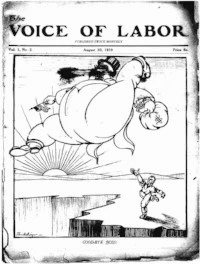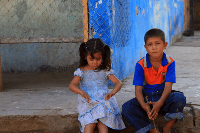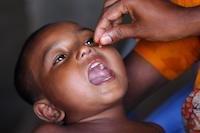
UC San Diego
School of Global Policy and Strategy
Tata Chancellor's Endowed Professor of Economics
Director, 21st Century India Center
Good Business Lab
Co-founder and CEO
- CV.

Achyuta Adhvaryu
Tata Chancellor's Endowed Professor of Economics
&
Director, 21st Century India Center
School of Global Policy and StrategyUniversity of California, San Diego
Affiliations: NBER, J-PAL, BREAD, GBL, IGC, CEGA
PhD, economics, Yale University (2009)
BA, math and economics, University of Pennsylvania (2004)
Research interests: development, organizations, health, applied micro
- RESEARCH.
Publications | Working Papers

How Do You Identify a Good Manager?
Managers matter a lot for team performance. We devise a method for identifying good managers using a novel allocation game, and find that this predicts performance better than standard measures of managerial skill. And this: team members who want the most to be managers tend not to be very good at management.
pdf | Quarterly Journal of Economics (accepted)

An Anatomy of Performance Monitoring
with Anant Nyshadham and Jorge Tamayo
Performance monitoring works because managers can better target skill investments in their workers. But skills depreciate, so failing to refresh training can result in dilution of productivity impacts over time.
pdf | Journal of Political Economy (accepted)

Sotto Voce: The Impacts of Technology to Enhance Worker Voice
with Smit Gade, Teresa Molina, and Anant Nyshadham
Enabling worker voice through a two-way, anonymous, SMS-based technology decreases absenteeism and turnover, despite infrequent usage. Our findings suggest a substantial option value of voice, which can promote positive workplace behaviors even when workers do not directly avail themselves of the technology.
pdf | Economic Journal (accepted)

No Line Left Behind: Assortative Matching Inside the Firm
with Vittorio Bassi, Anant Nyshadham, and Jorge Tamayo
Do talented managers match with productive workers, or with those who are struggling to perform? We find negative assortative matching of managers and workers. Despite supermodularity of production, "misallocating" managerial skill in this way may be optimal for firms who value buyer relationships.
pdf | Review of Economics and Statistics (accepted)

Absenteeism, Productivity, and Relational Contracts Inside the Firm
with Jean-Francois Gauthier, Anant Nyshadham, and Jorge Tamayo
We study the behavior of managers who share workers across teams to weather absenteeism shocks. Relationships have some smoothing value, but many potentially beneficial transfers are left unrealized. We simulate the gains to increased relationship formation and find that the firm could reduce worker misallocation and increase productivity substantially by spurring relationship formation.
pdf | Journal of the European Economic Association, 2024, 22:4

Dust and Death: Evidence from the West African Harmattan
Dust from the annual harmattan winds increases infant and child mortality in West Africa, but human adaptation has tapered these impacts over a 20 year period.
pdf | Economic Journal, 2024, 134:659

Fetal Origins of Mental Health: Evidence from Africa
with James Fenske, Namrata Kala and Anant Nyshadham

Hostel Takeover: Living Conditions, Reference Dependence, and the Wellbeing of Migrant Workers
with Anant Nyshadham and Huayu Xu
Worker satisfaction depends critically on how expectations are set by firms. Migrant workers experienced large losses in subjective wellbeing when randomized improvements in hostel living conditions were more modest than expected.
pdf | Journal of Public Economics, 2023, 226

Managerial Quality and Productivity Dynamics
with Anant Nyshadham and Jorge TamayoWhat makes a good manager good? We let the data tell us -- and find that hard-to-observe things like attention and control have large effects on productivity, and are drastically undervalued in manager pay.
pdf | Review of Economic Studies, 2023, 90:4 (lead article)

Returns to On-the-job Soft Skills Training
with Namrata Kala and Anant NyshadhamSoft skills training on-the-job boosts worker productivity and generates large returns for the firm.
pdf | Journal of Political Economy, 2023, 131:8

Expectations, Wage Hikes, and Worker Voice
with Teresa Molina and Anant NyshadhamA randomized evaluation of Hirschman's (1970) seminal theory. Workers quit when wage increases do not meet their expectations, but enabling voice mitigates this exit.
pdf | Economic Journal, 2022, 132:645

Management and Shocks to Worker Productivity
with Namrata Kala and Anant Nyshadham
When workers face environmental shocks, managers reallocate tasks within teams, shifting workers away from jobs in which their performance is most affected.
pdf | Journal of Political Economy, 2022, 130:1 (lead article)

Conflict and the Formation of Political Beliefs in Africa
with James Fenske
Helping Children Catch Up: Early Life Shocks and the Progresa Experiment
Cash transfers mitigate a large fraction of the negative impact of early life shocks on educational attainment and employment outcomes.
pdf | Economic Journal, 2022, 132(645)

Protecting Infants from Natural Disasters: The Case of Vitamin A Supplementation and a Tornado in Bangladesh
with Snaebjorn Gunnsteinsson, Teresa Molina, Parul Christian, Alain Labrique, Jonathan Sugimoto, Abu Ahmed Shamim, and Keith P. West, Jr.
Can policy protect against the often devastating human impacts of environmental shocks? We study this question by leveraging data from a situation in which a tornado tore through an area involved in a double-blind cluster-randomized controlled trial of at-birth vitamin A supplementation in Bangladesh.
pdf | Journal of Development Economics, 2022, 158

Resources, Conflict, and Economic Development in Africa
with James Fenske, Gaurav Khanna, and Anant Nyshadham
Our results help explain why conflict keeps the most resource-rich countries no better off than the most resource-poor.
pdf | Journal of Development Economics, 2021 (Issue 149)

(Mis)information and Anxiety: Experimental Evidence from a Covid-19 Information Campaign
with Sadish D. and Anant NyshadhamWe ask whether information can be delivered without negative consequences to mental health. We randomly assigned individuals to receive Covid-19 information through text messages, a pre-recorded audio message, or phone calls. Phone calls were effective at engaging individuals. They improved Covid-19 knowledge and reduced depression and anxiety; the amount of information delivered does not account for this effect.
pdf | Journal of Development Economics, 2021, 152

When It Rains It Pours: The Long-run Economic Impacts of Salt Iodization in the United States
Iodized salt increased women's income and labor force participation in the 20th century US.
pdf | Review of Economics and Statistics, 2020, 102(2)
 The Light and the Heat: Productivity Co-benefits of Energy-saving Technology
The Light and the Heat: Productivity Co-benefits of Energy-saving TechnologyLED lighting flattens the temperature-productivity gradient on hot days in Indian garment factories.
pdf | Review of Economics and Statistics, 2020, 102(4)
 Early Life Circumstance and Adult Mental Health
Early Life Circumstance and Adult Mental Health Booms, Busts, and Household Enterprise: Evidence from Coffee Farmers in Tanzania
Booms, Busts, and Household Enterprise: Evidence from Coffee Farmers in Tanzania
Health, Enterprise, and Labor Complementarity in the Household
with Anant Nyshadham Endowments at Birth and Parents' Investments in Childrenwith Anant Nyshadham
Endowments at Birth and Parents' Investments in Childrenwith Anant Nyshadham Returns to Treatment in the Formal Health Care Sector: Evidence from Tanzaniawith Anant Nyshadham
Returns to Treatment in the Formal Health Care Sector: Evidence from Tanzaniawith Anant NyshadhamWhy is formal sector care better than self-treatment for sick children?
pdf | American Economic Journal: Economic Policy, 2015, 7(3)
 Firing Costs and Flexibility: Evidence from Firms' Labor Adjustments to Shocks in Indiawith Amalavoyal Chari and Siddharth Sharma
Firing Costs and Flexibility: Evidence from Firms' Labor Adjustments to Shocks in Indiawith Amalavoyal Chari and Siddharth Sharma Schooling, Child Labor and the Returns to Healthcare in Tanzaniawith Anant Nyshadham
Schooling, Child Labor and the Returns to Healthcare in Tanzaniawith Anant Nyshadham The Long-Run Impacts of Adult Deaths on Older Household Members in Tanzaniawith Kathleen Beegle
The Long-Run Impacts of Adult Deaths on Older Household Members in Tanzaniawith Kathleen Beegle - RESEARCH.
Publications | Working Papers
On the Allocation and Impacts of Managerial Trainingwith Emir Murathanoglu and Anant Nyshadham
Managerial soft skills training improves productivity, but misallocation can substantially dampen its impacts.
pdf | supplemental appendix | december 2025 | Journal of the European Economic Association (conditionally accepted)
 Organizational Responses to Product Cycles
Organizational Responses to Product CyclesAn anatomy of the incredible, flexible organization -- how a leading auto manufacturer responds to the ever-increasing complexity of production associated with the introduction of new models on the shop floor.
pdf | november 2025 | R&R, Journal of Political Economy

Great Expectations: Responses to Current and Future Transfers for Low-Income Individuals
with Jean-Francois Gauthier, Pam Jakiela, and Dean Karlan
We study how the expectation of aid affects behavior by comparing people who were promised cash transfers to those who actually received them. Both receiving and merely being promised cash transfers increase labor supply and investment—while only immediate transfers raise spending and savings—results that reject standard life-cycle models and instead support a model in which transfers boost individual labor productivity.
pdf | february 2026 (NEW!)

Cooperation in Organizations: Evidence from Fast Food
with Parker Howell, Anant Nyshadham, and Jorge Tamayo
Good communication and coordination between managers and workers matter for organizational performance. In partiicular, we show that when managers and their teams happen to be matched on gender identity, quick-service restaurants can take better advantage of demand shocks.
pdf | december 2025 (NEW!)

Model Selection for Screening with AI in Hiring
with Jean-Francois Gauthier, Anant Nyshadham, and Jorge Tamayo
We develop a cost-sensitive screening framework that links vacancy value, interview costs, and labor-market tightness to a simple rule: escalate a candidate to interview if and only if the predicted probability of being truly qualified exceeds a cost-based threshold.
pdf | december 2025 (NEW!)

Training Midwives Saves Lives: Evidence from China’s New Midwifery Campaign
with Yawen Ding, Huayu Xu, and Qiong Zhang
China's midwife training campaign saved over half a million newborn lives each year and improved mothers' long-run health and economic outcomes.
pdf | august 2025 (NEW!)

Child Health, Parental Well-Being, and the Social Safety Net
with N. Meltem Daysal, Snaebjorn Gunnsteinsson, Teresa Molina, and Herdis Steingrimsdottir
Parents' preferences to personally provide care for their children during the critical years following a severe health shock drive persistent changes in labor supply and income -- evidence from childhood cancers in Denmark.
pdf | december 2024

Diagnosing Quality: Learning, Amenities, and the Demand for Health Care
with Emilio Gutierrez, Anant Nyshadham, and Jorge Tamayo
Increasing access to nontechnical amenities substantially drives up the demand for cataract surgery in Mexico.
pdf | july 2020
REVIEWS / OTHER
Platform Work: Evidence from Drivers in India, Indonesia, and Kenya
with Martin Atela, Valentina Brailovskaya, Priyanka Dua, Jenny Susan John, Pratibha Joshi, and Rivandra Royono
Working paper, 2025
Workers, managers, and productivity: How investments in workers can fuel India’s productivity growth
with Smit Gade, Jean-Francois Gauthier, Anant Nyshadham, and Sandhya Srinivas
India Policy Forum, 2023The Stakeholder Disagreement Metric (SDM): Quantifying Preference Disagreement Between Product Stakeholders
with Suzanne Chou et al.
Developing metrics for disagreement in the preferences of stakeholders in early-stage product design.
Journal of Mechanical Design, 2023
"He was trapped in his own web” - Dependent drinking as a poverty trap: a qualitative study from Goa, India
with Jaclyn Schess et al.
Qualitative evidence on alcohol consumption as a poverty trap in India.
published (gated) | Drug and Alcohol Review, 2020
Cash transfers for clinical and household economic outcomes among HIV-affected households in Uganda: A factorial randomized trial
with Ed Mills et al.
Can cash transfers improve the health of HIV-positive individuals in low-income settings?
published (gated) | AIDS, 2018
Management Quality and Worker Productivity in Developing Countries
Review article: management interventions can improve worker and firm productivity in low-income country contexts.
pdf | IZA World of Labor, 2018
An Experiment in India Shows How Much Companies Have to Gain by Investing in Their Employees
with Lavanya Garg, Namrata Kala, and Anant Nyshadham
A summary of our work on soft skills training for female garment workers in India.
link | HBR, 2017
Early Childhood Health and Development in India: A Review of the Evidence and Recommendations for the Future
with Prashant Bharadwaj and Samuel Krumholz
We review the status of early childhood development in India and make recommendations for future policy focus, informed by theory and evidence on interventions that work around the world.
pdf | NCAER-Brookings India Policy Forum, 2017
Psychological distress in Ghana: associations with employment and lost productivity
with Maureen Canavan et al.
What is the economic incidence of mental health disorders?
published | International Journal of Mental Health Systems, 2013, 7(9)
The Impact of a Novel Franchise Clinic Network on Access to Medicines and Vaccinations in Kenya
with Justin Berk
Franchised clinics may improve healthcare access for young children.
- TEACHING.
UC San Diego:
Econ 243: The Economics of Organizations in Developing Countries, 2024-present | PhD
GPGN 490: Doing Business in India, 2024-present | master's
GPIM 447: Organizational Economics, 2024-present | master's
_____________________________
PREVIOUS SYLLABI:
University of Michigan:
ECON 666: Economic Development, 2018-2022 | PhD | Syllabus
BUSABRD 320: Doing Business in India, 2018-2020 | BBA | Syllabus
BE 300 / BE 557: Applied Economics, 2015-2020 | BBA / master's | Syllabus
BE 888: Enterprise and Health in Emerging Economies , 2014, 2016 | PhD | Syllabus
HMP 663: The Economics of Health Management and Policy II , 2014 | MPH/MHSA | Syllabus
Yale:
HPM 591a: Global Health Economics, 2010-2012 | MPH | Syllabus
_____________________________





































